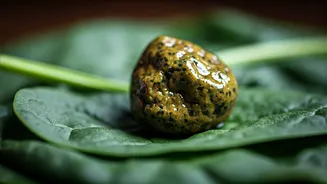Rising Cases Observed
A nutritionist reported observing six instances of gallbladder stones in postpartum women during the past month. This observation is a signal indicating
a notable increase in the incidence of this condition among women after giving birth. These cases, though specific to one professional's practice, point toward a possible broader health concern within this demographic. The rise suggests a need for increased awareness and possibly modified dietary and lifestyle recommendations for women post-delivery. The nutritionist's findings highlight a specific health issue that's becoming more prevalent and warrants further investigation into the contributing factors and the implementation of preventative measures.
Dietary Culprits Identified
The nutritionist has highlighted that dietary habits play a crucial role in the development of gallbladder stones. Specifically, the consumption of ghee, butter, and oil has been pinpointed as a primary factor. These foods are high in saturated fats and can contribute to the formation of stones in the gallbladder, especially when consumed in excessive amounts. The warning urges postpartum women to reconsider their food choices to minimize the risk of developing this painful condition. It is important to remember that a balanced diet is crucial for overall health, and this advice emphasizes the need to limit foods high in fats and instead include a variety of healthy foods in one's diet.
Preventive Dietary Adjustments
To reduce the risk of developing gallbladder stones, healthcare professionals advise making some dietary adjustments. One recommendation is to moderate the consumption of fatty foods such as ghee, butter, and oil. These foods, while part of traditional diets in many cultures, should be consumed in moderation after childbirth. A well-rounded diet, abundant in fruits, vegetables, and lean proteins, is crucial for maintaining good health and preventing gallbladder stones. Incorporating fiber-rich foods into the diet is also beneficial. Regular meals and proper hydration are other significant practices to ensure the healthy functioning of the digestive system.
Health Implications Explored
Gallbladder stones can lead to various health problems if left untreated. Symptoms may include abdominal pain, nausea, vomiting, and jaundice. Complications could include inflammation of the gallbladder (cholecystitis), blockage of the bile duct, and even pancreatitis. These issues can drastically affect quality of life. The health implications emphasize the importance of timely detection and management of gallbladder stones. Any symptoms should be checked by a healthcare provider for diagnosis and treatment. Seeking professional medical advice is essential to reduce the risks related to this health condition.
Professional Medical Advice
Consulting with a healthcare professional is crucial for anyone experiencing symptoms of gallbladder stones or wanting to take proactive steps to prevent them. A doctor can provide a diagnosis through various tests, including imaging scans. They can also offer personalized advice based on individual health profiles. This can include dietary recommendations, medication, or, in severe cases, surgical intervention. Healthcare providers are equipped to guide patients through diagnosis, treatment options, and preventive strategies. It's imperative to consult professionals rather than relying solely on self-diagnosis or advice from non-medical sources.



















